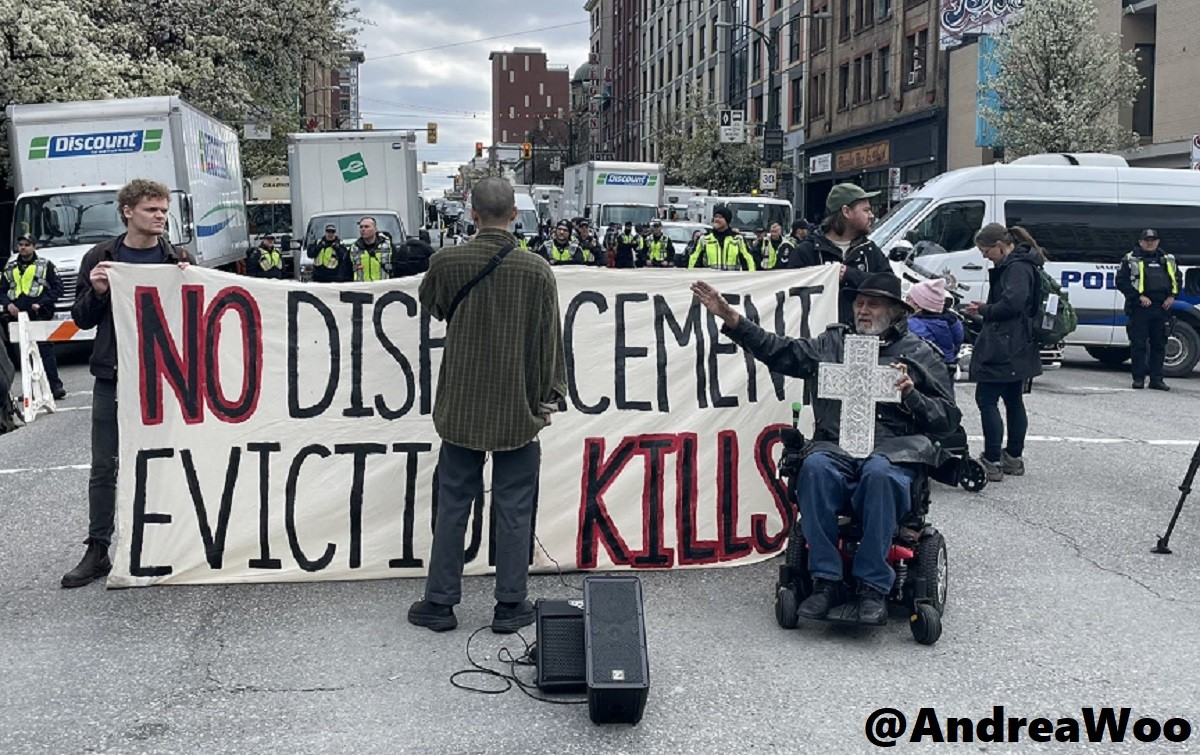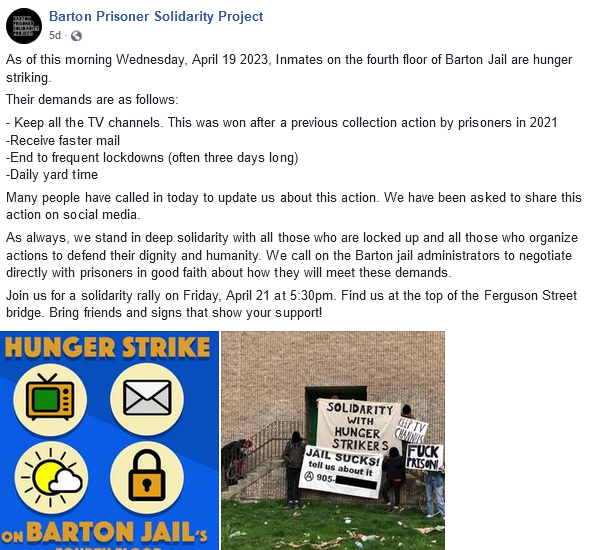Filed under: Canadian Tire Fire, Featured

photo: @AndreaWoo
After decades of struggle, the Asubpeeschoseewagong Netum Anishinabek First Nation (Grassy Narrows) has secured a major win in their fight to stop clear-cutting on their lands. This month, the Ministry of Natural Resources and Forestry notified the first nation that they are abandoning plans to open a portion of the forest to commercial logging, placing a 10-year logging ban on the land. The decision follows years of blockading logging roads on the territory, marching on the Ontario legislature, and taking legal action against the Ontario government.
For more than 2 decades, Grassy Narrows First Nation has blockaded the logging roads to protect the trees on their land. They sued the province of Ontario when it opened their traditional lands to clear-cutting. And now, it seems, they’ve won.
https://t.co/gvFJumPRpa— RAVEN (@RAVENtrust) April 13, 2023
Indigenous warriors have continued to hold it down at Camp Morgan Harris near the Brady Landfill outside Winnipeg. Folks have been intermittently blocking access to the landfill, and are holding strong in their calls to have the landfill searched for missing and murdered Indigenous women. On April 10th, the body of Linda Beardy, a woman from Lake St. Martin First Nation, was found at the site. Folks at the camp have called for others to join them, donate, or drop off supplies.
First Nation Indigenous Warriors
Crazy Indians holding it down at Camp #Morgan.
come to take a stand and join us in making Camp Morgan bigger#SearchTheLandFill pic.twitter.com/YZkaICmD2N— Waabishkaa Ma'iingan Naakshig (@CrazyNative1492) April 16, 2023
The Montreal Autonomous Tenants Union held a demonstration in the Mile End neighbourhood against the notorious Cucurulls, a family of landlords known for its history of evictions and for recently aggressing two renters who were delivering a petition. They have also planned a demonstration in opposition to the potential eviction of a tent city underneath the Ville Marie underpass in Montreal on April 25th.
Members of Montreal Autonomous Tenants Union (Syndicat de locataires autonomes de Montréal) are facing trumped up criminal charges after a large direct action against a landlord. Please support their legal defense defund. Solidarity is our weapon! https://t.co/3xU1llE8Bp
— julian francis park (@jfpark3) April 18, 2023
Street Sweeps in Vancouver
This month the City of Vancouver once again intensified its war on the poor. Beginning April 5th, the City undertook a multi-day police-led decampment of those living along Hastings Street in the downtown eastside. A document leaked the day before the decampment began details the City’s strategy, including allusions to escalating police violence. The plan states that unlike previous initiatives, police will “no longer disengage when tensions rise or protesters/advocates become too disruptive.” The plan maps Hastings Street into ‘higher’ and ‘lower-risk’ areas, based on resident responses to previous encampment clearings and the re-establishment of tents in those areas. The plan also describes ongoing enforcement in the area, first daily and then regularly.
The first days of the decampment included a large police presence and escalated enforcement, including the use of an exclusion zone, rooftop surveillance, the closure of several city blocks, and seemingly the disabling of local traffic cameras. As police pushed back residents and supporters and controlled movement in and out of the area, Vancouver city workers dismantled people’s shelters and cleared the area of all personal belongings. Multiple people were detained or arrested throughout the day.
City workers steadily disposing of structures, entire tents going into garbage trucks. Residents were given large city garbage bins yesterday to store belongings in; bunch of those around. Dozens of police officers, handful of ppl quietly protesting and holding up signs pic.twitter.com/kVzGg80F6N
— Andrea Woo | 鄔瑞楓 (@AndreaWoo) April 5, 2023
One account from local organizers details the weekly community meetings held by Hastings Street encampment and SRO residents and preparations for the coming evictions: “We spent the meeting talking about what to expect, how to avoid getting hurt by police, and where people would go after the eviction. Nobody knew.” At the end of the first day of the evictions, there were reportedly no shelter beds available in Vancouver.
Again, about a dozen tents on Hastings overnight and, again, city crews and police work to clear them and enforce fire chief’s order. According to leaked city plans, this will happen daily at first then assessed weekly. “May take several weeks or longer to re-set behavior.” pic.twitter.com/imtinhOkuO
— Andrea Woo | 鄔瑞楓 (@AndreaWoo) April 11, 2023
A call has been released for a week of solidarity actions from April 21-29.
#StopTheSweeps | Callout for #InternationalSolidarity | Week of Action April 21-29 2023. 1/13 pic.twitter.com/Prgp6IU9Kc
— Defund604Network (@defund604) April 19, 2023
Coastal Gaslink and RBC Developments
The past few weeks have been full of frustrating developments in the struggle against Coastal Gaslink Pipeline. Wet’suwet’en hereditary chiefs and community members attempted to attend the RBC Annual General Meeting to speak to shareholders about CGL and, despite having valid credentials to participate, they were segregated in a separate room with other racialized attendees and prevented from participating. RBC is a major funder of the Coastal Gaslink Pipeline and has been the target of divestment campaigns for a long time. It is not the first time RBC has gone out of its way to prevent Wet’suwet’en delegates from speaking at their shareholders meetings, but this time the sweeping refusal to allow for critical speakers also involved the exclusion of Black activists who had traveled to speak about the health impacts of fossil fuel projects on communities of colour on the Gulf Coast.
In the days following the AGM, a coalition of environmental groups published a report outlining the top fossil fuel funders in the world. All five major Canadian banks rank in the top 20 funders of fossil fuel development globally. Topping the list, however, is RBC. In 2022 it contributed over $42 billion US in funding, eclipsing all other banks and securing itself the top spot. It is unsurprising that a bank with this level of investment in the industry would attempt at all costs to prevent its shareholders from being confronted with the life threatening impacts of its business.
Some of those impacts were made clear mere days later, when Coastal Gaslink announced that their drilling under Wedzin Kwa had so far resulted in two spills of lubricant, one on land and one in a tributary of the river. This is of course one of the fears that Wet’suwet’en have had all along, despite empty industry assurances that the drilling was occurring far underground and would have no environmental impact.
In the midst of all of this, CBC ran a story parroting RCMP propaganda related to their investigation into an attack on a Coastal Gaslink worksite in February 2022. The article uncritically shared the cops’ story on their investigation thus far and promoted a ridiculous and tired narrative that anarchist “outside agitators” had infiltrated and taken control of Wet’suwet’en resistance. The classic “outside agitator” line has always been intended to break down solidarity, decrease public support, and sow distrust and paranoia. It goes without saying that cops are not to be trusted, either in their racist, simplistic, and divisive analyses of Indigenous-led anti-colonial movements, or in their specific comments stating what they do or don’t know about ongoing investigations. May the struggle against CGL continue, and all those participating stay safe and stay solid.
Prison News: Hunger Strikes and Impacts of Labour Actions

Over 180 prisoners at Hamilton’s Barton Jail are on hunger strike as of April 20. A report from the Barton Prisoner Solidarity Project explains:
This past Wednesday, April 19, 2023, we received word that prisoners on all the ranges on the fourth floor of the Barton Jail had coordinated to begin a hunger strike. At the same time and without knowing about what was going on upstairs, prisoners on the third floor had drafted and circulated a five-page letter outlining their issues with conditions in the prison. It was signed by all prisoners on several ranges and was delivered to the superintendant. Once the prisoners on 3 learned about the strike, they joined in the next day, on April 20.
The prisoners all felt that conditions inside the 700-person prison had degraded to a point where they needed to take action. The hunger strike coalesced around four main demands: faster mail delivery (it routinely takes months), an end to lockdowns (prisoners are frequently locked in their cells three days a week over the weekend), daily access to the yard (prisoners have been going months at a time without going outside), and, perhaps most importantly, for the jail to let them keep all the current TV channels.
On April 21, a public solidarity demo was held:
The demo went off beautifully. Lots of noise, lots of banners and signs, and a great speech from a BAPSOP member: “I look forward to the day that the prisoners and guards all take off their uniforms, burn them all in one pile, and then walk out the door together.” Special thanks to the harm reduction crew that showed up with costumes and signs and then threw a mini tailgate party at the end of the demo. The amount of noise coming from the jail was very impressive — it was like every person in the building was banging on the walls at once.
Prisoners at the Niagara Detention Centre are also on hunger strike as of this week. This information was released by the Ministry of Solicitor General, who would not share any detail about the prisoners demands.
Inmates inside the Barton Jail in #HamOnt could be heard banging against windows Friday evening as a small group of advocates rallied outside, demanding improved jail conditions.
Prisoners in Niagara Detention Centre are also on hunger strike. https://t.co/afLsz1sgYO
— Bobby Hristova (@bobbyhristova) April 22, 2023
As prisoners take action to fight for their basic rights, other prisoners are dealing with the repercussions of the ongoing PSAC nation-wide strike. The strike does not include guards or prison health care stuff, but does include administrative support and facilities staff, as well as parole board staff. Families of prisoners have been warned of potential disruptions to visits. There has been at least one instance of the strike impacting timely meal delivery prisoners, and another of a support worker being denied access when attempting to visit a prison. The strike also has the potential to impact prisoners’ access to programming, disrupting their ability to follow their ‘correctional plan’ and delaying their release.
.@psac_afpc strike is already having serious consequences in fed prisons whether or not guards are members. I’ve been told admin support, facilities, shipping & receiving and technology staff working at prisons are also part of PSAC.
CC @garthmullins @JustinPicheh @M_Gouldhawke— meenakshl (@mmeenaakshii) April 19, 2023
Withholding labour is a powerful way to pressure employers to come to the table and negotiate with workers. In most cases, labour actions deserve public support, and the blame for inconveniences caused by strikes should fall squarely on employers. However, a line of work that holds power over others and their ability to meet their basic needs is a choice. When the impacts of withholding labour lands on society’s most marginalized, who have been forced into a position of relying on the labour of others, workers put themselves in an unsupportable position.
All power to the prisoners!





